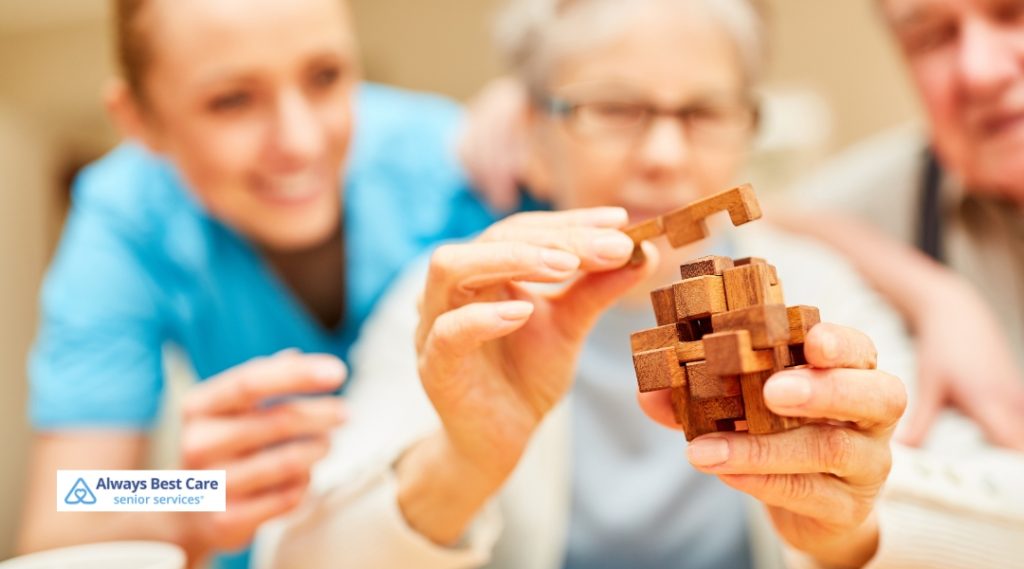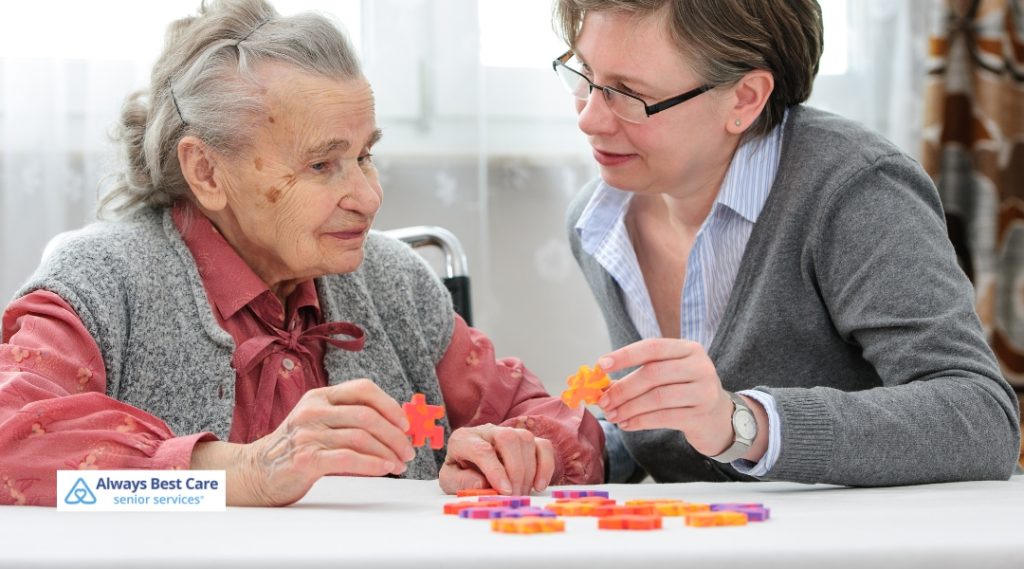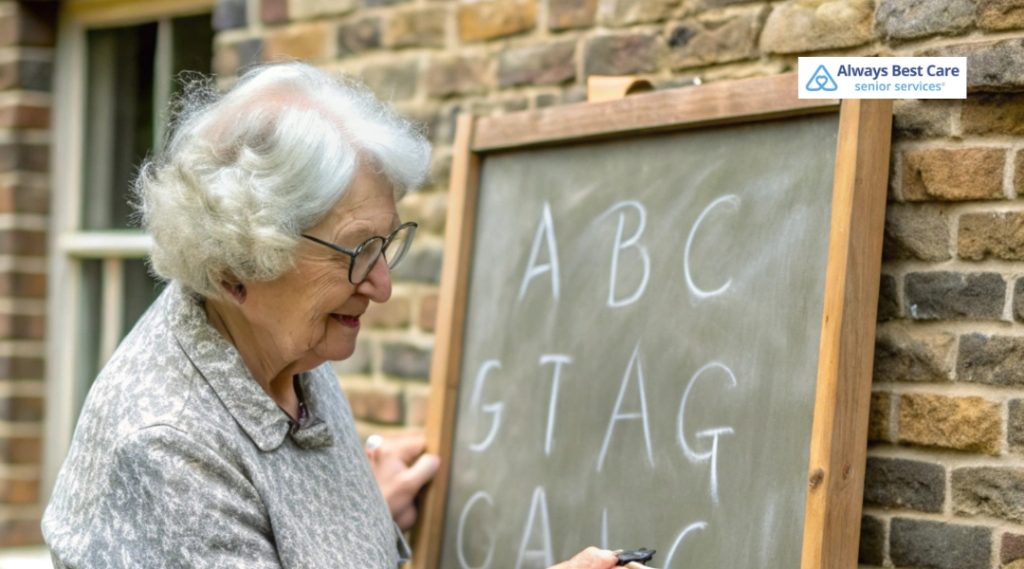9 Memory-Enhancing Activities and Therapies for Seniors With Dementia

When a loved one begins to show signs of dementia, the emotional and practical challenges can feel overwhelming.
At Always Best Care, we provide more than just care; we offer knowledgeable guidance, hands-on support, and the deep compassion families need during every stage of the journey.
Whether you’re looking for at-home assistance, help transitioning to in-home memory care, or simply someone to walk beside you during difficult decisions, our team is here for you.
Table of Contents
How Our Team Has Helped Families Facing Dementia
At Always Best Care, the heart of our work lies in building relationships and offering support that truly meets families where they are. For many, our caregivers don’t just assist, they become part of the family.
Jennie shared her experience: “We have had a routine schedule for Amber or Tina to come to our house, where they have become an important part of our family… Both of them are reliable and exceptionally caring.”
For other families, the challenges extend beyond daily care to the difficult transition into a memory care facility. That’s when the expertise of our care coordinators becomes a lifeline.
Anna recalled how our team helped her family take the next step: “Nancy Hemming spent so much time with us visiting facilities and teaching us about different models. She is so knowledgeable and was essential help when we didn’t know how to approach the search.”
Always Best Care ensures that geography doesn’t stand in the way of quality care or peace of mind. Anna described the relief she felt knowing her mother was in good hands:
“I live out of state and needed quick assistance with my mother who started to show signs of dementia. Nancy and her staff stepped up and delivered AAA+ care and coverage… They also helped take the burden off of me in moving her out of her house she lived in for 50 years to an assisted care facility.”
These stories reflect what we strive for every day: to be the dependable, compassionate support system families can count on, especially when life gets hard.
How We Support Cognitive Health
In addition to providing hands-on care and family guidance, our caregivers are trained to help seniors stay mentally engaged and emotionally connected. From daily routines to personalized activities, we focus on preserving dignity, stimulating memory, and promoting joy.
With that in mind, here are nine memory-enhancing activities and therapies we regularly use to support seniors living with dementia.

1. Cognitive Stimulation Therapy (CST)
Cognitive Stimulation Therapy (CST) is a structured, evidence-based group intervention designed for people with mild to moderate dementia.
It involves themed activities that engage thinking, concentration, and memory, typically delivered in twice-weekly sessions over several weeks. CST focuses on enhancing general cognitive function while encouraging social interaction, communication, and enjoyment.
According to the Alzheimer’s Society, CST has been shown to improve quality of life and cognitive function comparably to certain dementia medications. Activities may include word games, discussions of current events, and creative tasks, all tailored to promote mental engagement and a sense of normalcy.
2. Cognitive Rehabilitation
Cognitive rehabilitation takes a highly personalized approach, helping individuals with dementia maintain independence by focusing on specific daily challenges. This therapy is goal-oriented, focusing on tasks such as remembering appointments, using a phone, or navigating familiar spaces.
A therapist works alongside the person and their caregiver to develop practical strategies. These might involve environmental adjustments such as labeling drawers, routine building, or using memory aids.
The Alzheimer’s Society notes that this approach empowers individuals by aligning with their personal values and everyday needs.
3. Reminiscence Therapy (RT)
Reminiscence Therapy uses prompts such as photographs, music, or familiar objects to stimulate memories from a person’s past, typically from childhood or early adulthood. This therapeutic technique taps into long-term memory, which is often better preserved in those with dementia.
Research published in 2023 highlights RT’s ability to improve mood, reduce anxiety, and strengthen identity and self-worth in individuals with dementia. It is often used in group settings to promote social connection or in one-on-one sessions tailored to a person’s unique life story.

4. Games and Puzzles
Games and puzzles offer enjoyable and cognitively stimulating ways to engage individuals with dementia. Activities like matching cards, word searches, jigsaw puzzles, and sorting tasks can help maintain memory, reasoning, and fine motor coordination.
Healthline notes that these types of games promote mental activity in a low-pressure, entertaining environment. Importantly, they also foster moments of success and confidence, particularly when tailored to the individual’s cognitive level and interests.
5. Reading and Personal Hobbies
Reading, even in short bursts, can help stimulate memory and attention in individuals with mild cognitive impairment (MCI) and early-stage dementia. When paired with personal hobbies such as painting, gardening, or knitting, these activities promote autonomy and preserve identity.
A 2024 report found that hobbies involving sustained attention and cognitive engagement can delay cognitive decline. Encouraging individuals to pursue familiar or modified versions of their favorite pastimes supports both mental health and emotional well-being.
6. Learning New Skills and Digital Activities
Contrary to the assumption that older adults can’t learn new skills, engaging in novel cognitive tasks, including digital games, tablet use, or learning a new language, may have brain-boosting effects. These activities stimulate neural pathways that support memory and attention.
According to the National Institute on Aging, staying mentally active through learning helps build cognitive reserve, which can delay symptoms of decline. Digital technologies can also offer accessible ways to stay connected and engaged, from brain-training apps to virtual tours.

7. Exercise and Movement
Physical activity isn’t just beneficial for physical health; it also directly supports cognitive function. Aerobic exercise, strength training, tai chi, and even walking have been shown to improve attention, processing speed, and executive functioning.
A 2023 study confirmed that exercise boosts blood flow to the brain, promotes neurogenesis, and reduces dementia-related inflammation. Programs tailored to mobility levels help maintain coordination, reduce fall risk, and improve overall mood.
8. Music and Social Connection
Music is a powerful tool for unlocking memory and emotional expression in people with dementia. Familiar songs can evoke vivid recollections and soothe agitation, while rhythm-based activities stimulate motor and cognitive regions of the brain.
A 2022 study archive found that music therapy, especially when paired with social interaction, reduced behavioral symptoms and supported language and memory retention. Singing groups, music listening sessions, and interactive drumming circles are all effective formats.

9. Mnemonic Strategies That Work
Mnemonic strategies involve using memory aids, like rhymes, acronyms, or visualization, to help recall names, events, or steps in a task. While more effective in earlier stages of dementia or mild cognitive impairment, these tools can support independence.
According to recent findings, techniques such as spaced retrieval and the method of loci (associating information with physical locations) help reinforce memory patterns and boost confidence. Caregivers can assist by reinforcing these strategies through regular, positive reinforcement.
Expert Dementia Support From Our Trained Caregivers!
Contact Always Best Care of Denver at (303) 952-3060 to learn more and schedule your free consultation.





